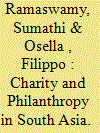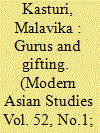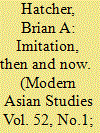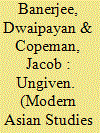|
|
|
Sort Order |
|
|
|
Items / Page
|
|
|
|
|
|
|
| Srl | Item |
| 1 |
ID:
158565


|
|
|
|
|
| Summary/Abstract |
With an interest in historicizing contemporary philanthropic formations such as corporate social responsibility, this article outlines the modern Indian governmental coding of charity as a function of profit. To do so, it charts a trajectory of legal-fiscal policy on charitable tax exemption in India, especially since the 1940s. Informed by the study of vernacular capitalism, research on economization and on epistemologies of calculation, the analysis maps juridical trajectories on the idea of charity, its relationship with trade, and, more specifically, profit-making. It demonstrates how the legal mechanism of the public trust, which serves in the late nineteenth century to institutionalize a strict distinction and separation between charity and profit-making, later reconfigures and connects them by buttressing the main legal criterion for charity in India, that is, ‘general public utility’. This legal story is deployed to draw attention to philanthropy more broadly as a key terrain for research on processes of economization and neoliberal governing. At the same time, the argument also works against the grain of palimpsests in contemporary public discourse which stage a continuous and direct line from pre-colonial vernacular practices to Indian philanthropy today.
|
|
|
|
|
|
|
|
|
|
|
|
|
|
|
|
| 2 |
ID:
158561


|
|
|
|
|
| Summary/Abstract |
Why should we care about giving in modern South Asia, and why now? These are among the questions at the forefront of this special issue whose contributors explore charitable practices and philanthropic transformations in diverse historical and cultural contexts across the colonial/post-colonial divide at a time when trade liberalization, the transformation of state welfare-ism, and the consolidation of a global economy has led to a deepening of neo-liberal regimes across the region as well as political and religious fundamentalisms. We also write at a time when non-governmental organizations have proliferated across the region, as has the discourse regarding humanitarian aid for a diverse range of development projects. This special issue, then, seeks to throw light on what is new and different, and what persists in the context of the region's long and well-established traditions of giving. Who gives and toward what purposes and with what stated intentions? How have acts of giving changed over time and across cultural, religious, and regional complexes? What are the institutional frameworks within which specifically local, national and regional mechanisms and instruments of giving intersect with global practices? How do the economic and financial incentives interact with ethical and affective imperatives to give?
|
|
|
|
|
|
|
|
|
|
|
|
|
|
|
|
| 3 |
ID:
158568


|
|
|
|
|
| Summary/Abstract |
High skilled’ Kamma migrants from Coastal Andhra domiciled in the USA maintain strong ties with their villages and towns of origin. Since the 1990s, one key way in which they have sustained relations with their roots is through transnational philanthropy. Over the last two decades, migrant donors have diversified the modalities of their philanthropic engagements, increasingly institutionalizing them through US-based transnational associations. While the institutionalization of philanthropy may appear to be an import from the USA, closer examination reveals its historical antecedent in the caste-based Varaalu system practised by the Kammas during the late colonial period. The transnationalization of older forms of giving are marked by key modifications in the way giving is conceptualized—from being localized, need based, and individualized to being based on merit, efficiency, and professionalization. The term ‘donation’ is used to describe their philanthropy, rather than daan or charity, and the politics of semantics points to the modernizing impulse within the community to transcend caste owing to their diasporic location. Yet, by aiming to reach deserving beneficiaries while upholding meritocracy, donors often circulate philanthropic resources horizontally on a caste inflected and highly politicized transnational plane. The discourse and practices of transnational giving in post-reform India bring out the contradiction that simultaneously obscures the workings of a caste while transnationalizing its boundaries.
|
|
|
|
|
|
|
|
|
|
|
|
|
|
|
|
| 4 |
ID:
158562


|
|
|
|
|
| Summary/Abstract |
This article explores the ways in which Pachaiyappa Mudaliar (1754?–1794) has been panegyrized as the quintessential benefactor of our times in Tamil prose, poetry, and pictures over the course of the past century and a half. In the bureaucratic and legal documents of the colonial state, he appears as a rapacious moneylender and behind-the-scenes wheeler-dealer, a member of that hated class of ‘Madras dubashes’, a ‘most diabolical race of men’. In contrast, Tamil memory work since at least the 1840s has differently recalled this shadowy eighteenth-century man as a selfless philanthropist whose vast wealth financed some of the earliest educational institutions in the Madras Presidency. I track the posthumous fate of Pachaiyappa's bequest to argue that even as the founding of the public trust and its educational philanthropy departed radically from his willed intentions, a new complex of living, dying, and giving for the sake of native education was put in place in the Tamil country in the age of colonial capital and pedagogic modernity.
|
|
|
|
|
|
|
|
|
|
|
|
|
|
|
|
| 5 |
ID:
158569


|
|
|
|
|
| Summary/Abstract |
Parsis (Indian Zoroastrians), a small traditionally endogamous group, are well known in India for their philanthropic giving. The Parsis of Mumbai are beneficiaries of hundreds of Parsi public charitable trusts today, and this article will show how trusts, as particular forms of giving, establish perpetual communal obligation connecting the past and present. It will show how the circulation of personal assets through customary inheritance within a family is replaced by the trust with the circulation of communal obligations in perpetuity. While this mechanism of giving has a marked endurance, what has changed is what constitutes ‘the good’ within these deeds. Moving away from traditional philanthropic practices of subsidizing education, medical care, and welfare to the poor, the focus of giving has shifted to the pursuit of communal reproduction, both biological and social.
|
|
|
|
|
|
|
|
|
|
|
|
|
|
|
|
| 6 |
ID:
158564


|
|
|
|
|
| Summary/Abstract |
From the early twentieth century, Hindu socio-religious and political bodies debated the use that maths (monastic establishments) made of their wealth, amassed in large part through dana (socio religious gifts). From the early nineteenth century, Anglo Hindu law on inheritance, and thereafter the Religious and Charitable Endowments Acts, had enabled the autonomy of maths by classifying them as private religious corporations, not charitable endowments. This article suggests that the math reform campaign between 1920 and 1940 in north India was impelled by the preoccupations of heterogeneous Hindu political and socio-religious organizations with dana and its potential to fund cultural and political projects regenerating an imagined Hindu socio-religious community. Specifically, the Hindu Mahasabha yoked dana to its Hindu sangathan (unity) campaign to strategically craft an integrated ‘Hindu public’ transcending sampraday (religious traditions) to protect its interests from ‘external enemies’. My discussion probes how the Hindu Mahasabha and its ‘reformist’ allies urged the conversion of maths into public charitable trusts, or endowments accountable to an ephemeral ‘Hindu public’ and the regulation of their expenditure. Monastic orders, guru-based associations like the Bharat Dharma Mahamandala, and the majority of orthodox Hindus successfully opposed this campaign, defending the interests of maths and sampraday before and after independence. In so doing, they challenged Hindu sangathan by articulating alternative visions of the socio-religious publics and communities to be revitalized through philanthropy. Through this discussion, the article charts the uneasy relationship between monasticism and an emerging Hindu nationalist cultural and political consciousness that remained fractured and internally contested.
|
|
|
|
|
|
|
|
|
|
|
|
|
|
|
|
| 7 |
ID:
158563


|
|
|
|
|
| Summary/Abstract |
The goal of this article is to provide conceptual and historical orientation useful for thinking about the emergence of philanthropy in modern South Asia. Conceptually, the article suggests the need to approach the expression of philanthropy in early colonial Bengal in terms of processes of imitation. To do so, we must overcome the stigma attached to the idea of imitation within both nationalist and post-colonial thought. In the particular context of early colonial Calcutta, local actors entered into intimate relationships with Europeans and these relationships provided occasions to borrow, translate, and retool a range of ideas and practices relevant to new modes of public charity. The importance of attending to historical context is suggested by reading such early colonial developments against the grain of late nineteenth-century perspectives—a time when Bengalis grew anxious about cultural imitation. Rather than deferring to these late-colonial anxieties over imitation, we need to situate them within a critically informed historical framework. To do this, the present article draws on the writings of the Brāhmo intellectual Rajnarain Bose, who pondered the relationship between an earlier colonial moment (‘then’) and his own late-colonial ‘now’. Close reading of Bose allows us to plumb the nature of late-colonial anxiety about cultural borrowing while opening up a new perspective on imitation and intimacy in early colonial Bengal that is not predicated on the teleology of the late-colonial modern.
|
|
|
|
|
|
|
|
|
|
|
|
|
|
|
|
| 8 |
ID:
158566


|
|
|
|
|
| Summary/Abstract |
Based on fieldwork in Bibiyana, northeast Bangladesh, this article compares the transnational charity offered to known individuals by migrant, UK-based families with the philanthropic efforts of the multinational company Chevron, which operate a large gas field in the neighbourhood. Applying Fassin's notion of the ‘politics of suffering’ to both types of exchange, the article argues that the two types of giving are underlain by incommensurate moral economies. While in instances of transnational charity, social inequality and the compassion felt towards the suffering of known people, or ‘our own poor’, underscore the exchanges, in the philanthropic efforts of ‘community engagement’ the inequality of giver and receiver is repressed and the exchange is animated by a moral economy. The latter is rooted in Christianity, in which compassion guides actions towards the suffering of unknown, anonymous strangers.
|
|
|
|
|
|
|
|
|
|
|
|
|
|
|
|
| 9 |
ID:
158570


|
|
|
|
|
| Summary/Abstract |
Islamic almsgiving is on the rise among Muslims in India, as charitable donations by individuals come to supplant landed endowments as the lifeblood of many Islamic associations. Techniques of mass fundraising in India by Islamic revivalist movements such as Deoband facilitated their expansion across the subcontinent. Such fundraising depended on documentary practices such as verification letters, lists of donors, and receipts for donations. This article illustrates how charity receipts and other documents that change hands in ritual Islamic almsgiving are also a key part of new Indian Muslim collective identities. Moral ties as well as money circulate in this Islamic charity economy. Financial documents are Islamic philanthropy's answer to ‘print capitalism’, serving as material rituals of symbolic community across vast distances. Moreover, the use of documents in traditional Islamic almsgiving is also inflecting pious Muslims’ spiritualities. Islamic charity receipts in particular are contributing to the individualization of religiosity among Lucknow Muslims. New modes of accounting (originally intended to ensure financial compliance) also allow Muslim almsgivers to ‘account’ for accrued piety in a perceived spiritual merit economy.
|
|
|
|
|
|
|
|
|
|
|
|
|
|
|
|
| 10 |
ID:
158572


|
|
|
|
|
| Summary/Abstract |
Drawing on field research principally from contexts of medical blood donation in North India, this article describes how gifts that are given often critique—by obviation—those that remain ungiven: the care not provided by the Indian state for Bhopal survivors, the family members unwilling to donate blood for their transfusion-requiring relative, and so on. In this way, giving can come to look like a form of criticism. The critiques that acts of giving stage are of absences and deficits: we present cases where large paper hearts donated by survivors of the 1984 Bhopal Gas Disaster to the prime minister of India signal his lack of one, where donated human blood critiques others' unwillingness to do so, where acts of blood donation critique and protest communal violence, and where similar acts of giving over simultaneously highlight a deficit in familial affects and an attempt to resuscitate damaged relational forms. We thus illustrate how critique can operate philanthropically by way of partonomic relations between the given and not-given.
|
|
|
|
|
|
|
|
|
|
|
|
|
|
|
|
| 11 |
ID:
158567


|
|
|
|
|
| Summary/Abstract |
Our title quotation is taken from an interview with the chief trustee of a leading Hindu temple in south London, and captures the curious mixture of philanthropy, politics, and individual ambition that has emerged around Sri Lankan Tamil temples in the diaspora. During the long years of civil war, temples became centres of mobilization for the growing Tamil diaspora, and were often accused of channelling funds to the LTTE (Liberation Tigers of Tamil Eelam) and its various front organizations. Since the end of the war, in 2009, the same temples now support orphanages and other good works in Sri Lanka, and their efforts are starting to be emulated by temples in Sri Lanka itself. At the heart of our article is a dispute between the UK Charity Commission and the chief trustee of a London temple, who is accused of misuse of temple funds and ‘failure to dissociate’ the temple from a terrorist organization. A close reading of the case and its unexpected denouement reveals the difficulties of bounding the zone of philanthropy.
|
|
|
|
|
|
|
|
|
|
|
|
|
|
|
|
| 12 |
ID:
158571


|
|
|
|
|
| Summary/Abstract |
Recent research on contemporary modalities of Islamic or Muslim philanthropy has focused on processes of subjectification through which givers and recipients of charity are habituated or craft themselves to an ethic of piety, social responsibility, and (neoliberal) economic virtuosity. These studies, however, have concentrated almost exclusively on those who give charity, leading to an over-emphasis on the perspectives of givers, and on their role in determining how the poor might deal with their everyday lives and imagined futures. As a result, small-scale gifting relations in which the Muslim poor may also be involved—making the poor simultaneously givers and recipients of charity—have been obscured or erased altogether. In this article, we argue that the concerns of the poor might not always or necessarily be those of the wealthy donors of charity. By receiving and giving sadaqa and zakat, poor and working-class Muslims in a Colombo neighbourhood imagine inclusion and belonging to the wider Muslim community in Colombo, which is not contingent upon the mediation and pedagogical interventions of charitable organizations and (middle-class) pious donors. Importantly, this imagination of inclusion and belonging comes at a time when the Muslim poor are increasingly marginalized by virtue of a (middle-class) discourse that, by framing charity as a means ‘to help the poor to help themselves’, has turned socio-economic upliftment into an ethical duty and, consequently, failure to improve oneself has become the symptom of wider moral shortcomings.
|
|
|
|
|
|
|
|
|
|
|
|
|
|
|
|
|
|
|
|
|